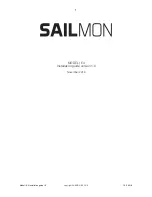
Ultra Tugger
®
10 Cable Puller and Pulling Packages
Greenlee / A Textron Company
4455 Boeing Dr. • Rockford, IL 61109-2988 USA • 815-397-7070
12
Cable Pulling Principles
(cont’d)
Gravity
Weight
of Cable
Conduit
Friction
Tailing
Force
Pulling Force
35.6 kN
(8000 lb)
Cable Pulling Theory Illustrated
Pulling Theory
This section introduces the main ideas involved with
pulling cable.
Pulling Resistance
The cable puller must overcome two types of resistance:
gravity and friction.
Gravity constantly exerts its force on the vertical
portions of the run. When the pulling force is relaxed,
gravity attempts to pull the cable downward. Friction
develops where the cable contacts the sheaves,
conduit, and tray. Friction resists any movement,
forward or backward, and tends to hold the cables in
place.
To accomplish a cable pull, the cable pulling system
must develop more force than the combination of
gravity and friction.
Generating Pulling Force
To generate pulling force, the capstan works as a
force multiplier
. The operator exerts a small amount
of force on the rope. The cable puller multiplies this
and generates the pulling force.
This pulling force is applied to the rope, connectors,
and cable in order to accomplish the pull. The direc-
tion of force is changed, where necessary, with pulling
sheaves.













































